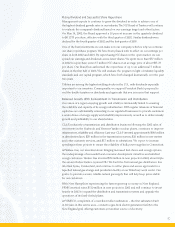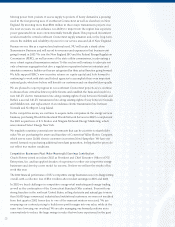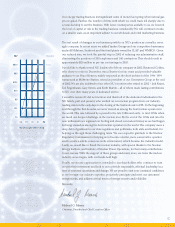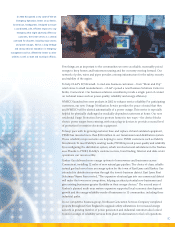Eversource 2002 Annual Report Download - page 17
Download and view the complete annual report
Please find page 17 of the 2002 Eversource annual report below. You can navigate through the pages in the report by either clicking on the pages listed below, or by using the keyword search tool below to find specific information within the annual report.
15
Financial Condition
Overview
Consolidated: Northeast Utilities and subsidiaries (NU or the company)
reported 2002 earnings of $152.1 million, or $1.18 per share compared
with earnings of $243.5 million, or $1.79 per share in 2001 and a loss of
$28.6 million, or $0.20 per share in 2000. In 2002 and 2001, the divestiture
of nuclear generation assets in which NU had a significant ownership
interest had a material positive impact on the company’s financial
results. All per share amounts are reported on a fully diluted basis.
During 2002, NU recorded after-tax gains totaling $24.5 million, or
$0.19 per share, associated with the sale of its ownership interest in
the Seabrook nuclear units (Seabrook) and the elimination of reserves
associated with its ownership share of Seabrook assets. During 2001,
NU recorded a net after-tax gain of $115.6 million, or $0.85 per share,
associated with the sale of its ownership interest in the Millstone
nuclear units (Millstone).
During 2002 and 2001, NU recorded various other charges. During
2002, NU recorded an after-tax loss of $11 million, or $0.09 per share,
primarily associated with the write-down of investments in NEON
Communications, Inc. (NEON) and Acumentrics Corporation
(Acumentrics). During 2001, NU recorded an after-tax loss of $22.4 million,
or $0.17 per share, as a result of the adoption of Statement of Financial
Accounting Standards (SFAS) No. 133, “Accounting for Derivative
Instruments and Hedging Activities,” as amended, and an after-tax loss
of $35.4 million, or $0.26 per share, associated with an agreement with
two financial institutions to repurchase NU common shares. Excluding
the aforementioned nuclear generation asset divestitures and other charges,
NU earned $138.6 million in 2002, compared with $185.7 million in 2001.
NU’s revenues for 2002 decreased to $5.2 billion from revenues of $6
billion for 2001. The decrease in revenues is due to lower competitive
energy subsidiary revenues and lower regulated subsidiary revenues.
The decrease in the competitive energy subsidiaries’revenues is primarily
due to lower wholesale marketing revenues from Select Energy, Inc.
and subsidiary (Select Energy) full requirements contracts, primarily
due to lower energy prices. The decrease in the regulated subsidiaries’
revenues is due to lower regulated wholesale and retail revenues.
Regulated wholesale revenues decreased primarily due to lower sales
associated with purchase-power contracts, lower wholesale sales in
New Hampshire and the 2001 revenue associated with the sale of
Millstone output. The decrease in regulated retail revenue is primarily
related to a rate decrease at Public Service Company of New
Hampshire (PSNH), a decrease of the Western Massachusetts Electric
Company (WMECO) standard offer rate and a decrease in Yankee Gas
Services Company (Yankee Gas) revenues associated with lower gas
sales and lower 2002 rates.
NU’s earnings per share (EPS) continued to benefit from the company’s
ongoing share repurchase program. During 2002 NU repurchased
3.7 million shares at an average price of $15.78 in addition to the 14.3 million
shares repurchased in 2001 at an average price of $20.34. The company
had 127.6 million shares outstanding at December 31, 2002, compared
to 130.1 million outstanding shares on December 31, 2001.
In January and February 2003, NU repurchased an additional 1.1 million
shares at an average price of $14.44 and can repurchase an additional
6 million shares through June 30, 2003, under an existing resolution
approved by the NU Board of Trustees.
The share repurchase program is part of a fundamental restructuring of
NU’s earnings base that has taken place since 1999. Over the past four
years, NU’s regulated subsidiaries have sold nearly 5,000 megawatts
(MW) of New England electric generation to unaffiliated companies for
approximately $2 billion and have securitized more than $2 billion of
stranded costs. The proceeds from those sales and securitizations have
allowed NU to reduce its combined level of debt and preferred stock by
nearly 50 percent since the end of 1997. However, the reduction of NU’s
generation plant and lower level of regulatory assets also has significantly
reduced the earnings power of NU’s regulated electric businesses.
NU has partially offset that lower regulated earnings base by acquiring
Yankee Energy System, Inc. (Yankee) in 2000, lowering debt and preferred
stock levels, repurchasing common shares, making needed investments
in its regulated electric distribution and transmission infrastructure,
and expanding into the competitive energy business in the Northeast
United States. To date, the success of those efforts has been mixed.
The retirement of debt has significantly improved NU’s consolidated
balance sheets, and NU’s credit ratings are higher than they have been
in at least three decades. Share repurchases have been accretive, and
Yankee has been well integrated into NU. NU is in the early stages of
its regulated distribution and transmission investment program. As this
program progresses, the regulated earnings base will increase over the
next several years. However, NU’s investment of more than $500 million
of equity into its competitive energy businesses has not yet produced
the long-term return on investment management requires. A key
focus of management in 2003 will be to improve competitive business
performance significantly.
Regulated Utilities: Performance among NU’s five regulated subsidiaries
varied in 2002 with three posting lower results than in 2001 and two
posting stronger results. Net income before the payment of preferred
dividends totaled $85.6 million at The Connecticut Light and Power
Company (CL&P), compared with $109.8 million in 2001. The lower
2002 net income was largely attributable to an after-tax gain of $17.7
million CL&P recorded in 2001 associated with the sale of Millstone.
Net income before the payment of preferred dividends at PSNH totaled
$62.9 million in 2002, compared with $81.8 million in 2001. The lower
2002 net income was largely due to an after-tax gain of $15.5 million
PSNH recorded in 2001 as a result of the sale of PSNH’s share of the
Millstone 3 nuclear unit. Net income at Yankee totaled $15.9 million in
2002, compared with $25.8 million in 2001. The lower 2002 net income
was primarily due to the mild first quarter of 2002, usually Yankee Gas’
most profitable period of the year, and to the after-tax recognition
of approximately $10 million in 2001 related to a favorable property
tax settlement.
Management’s Discussion and Analysis
























